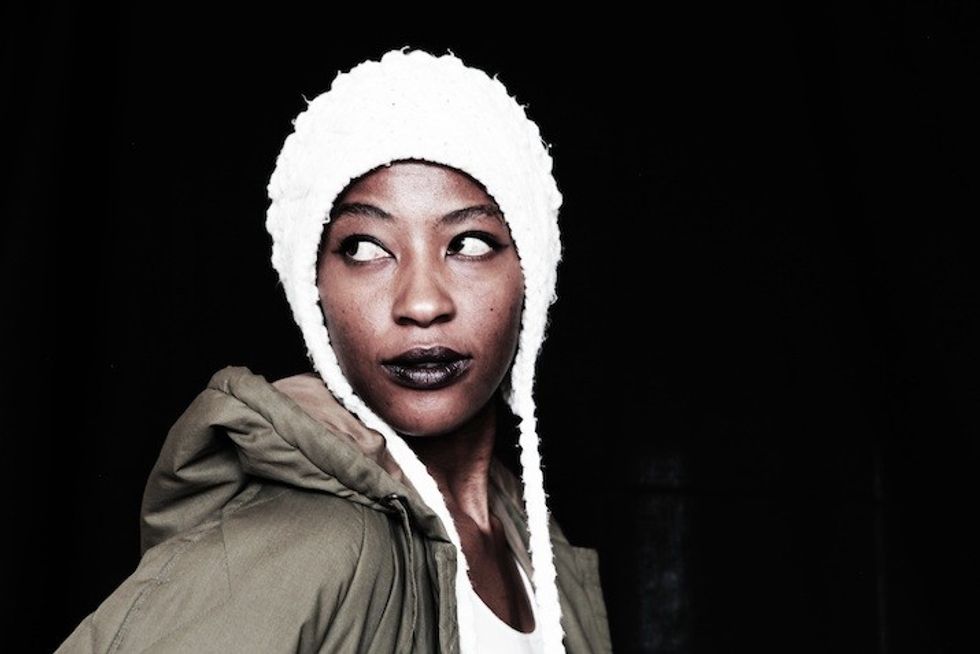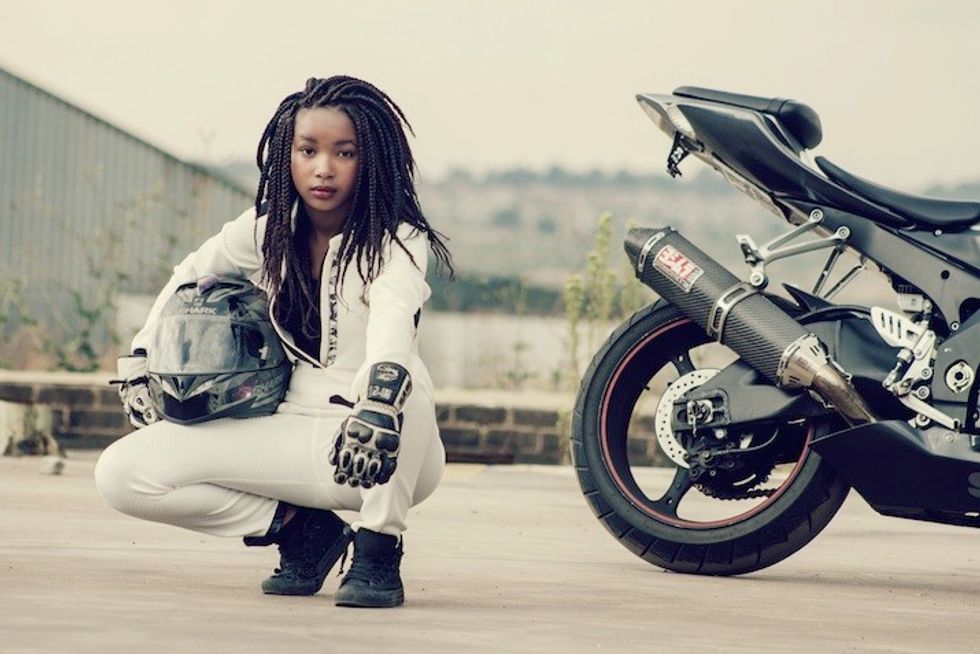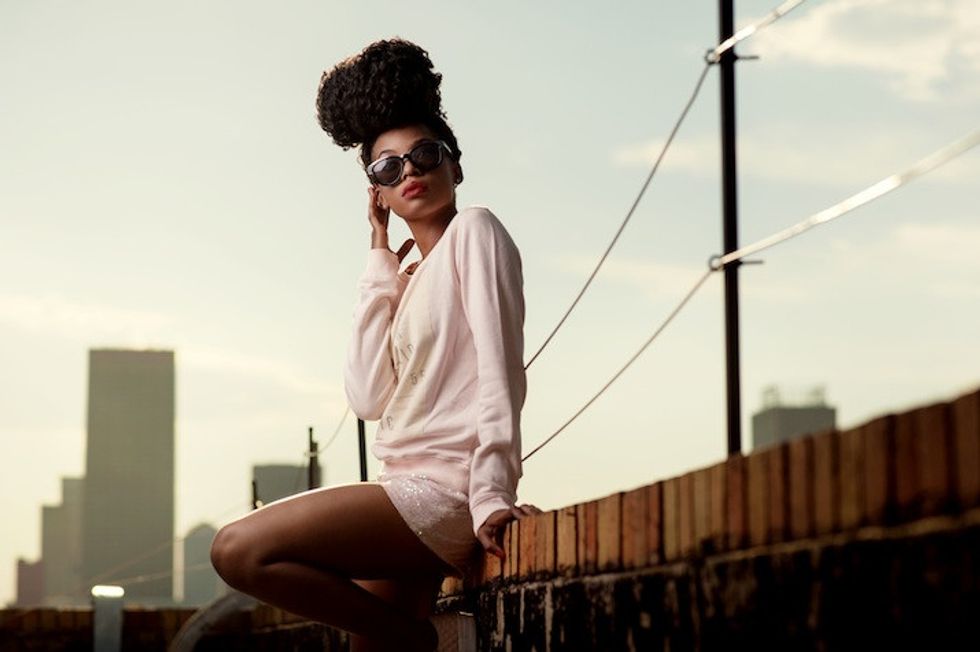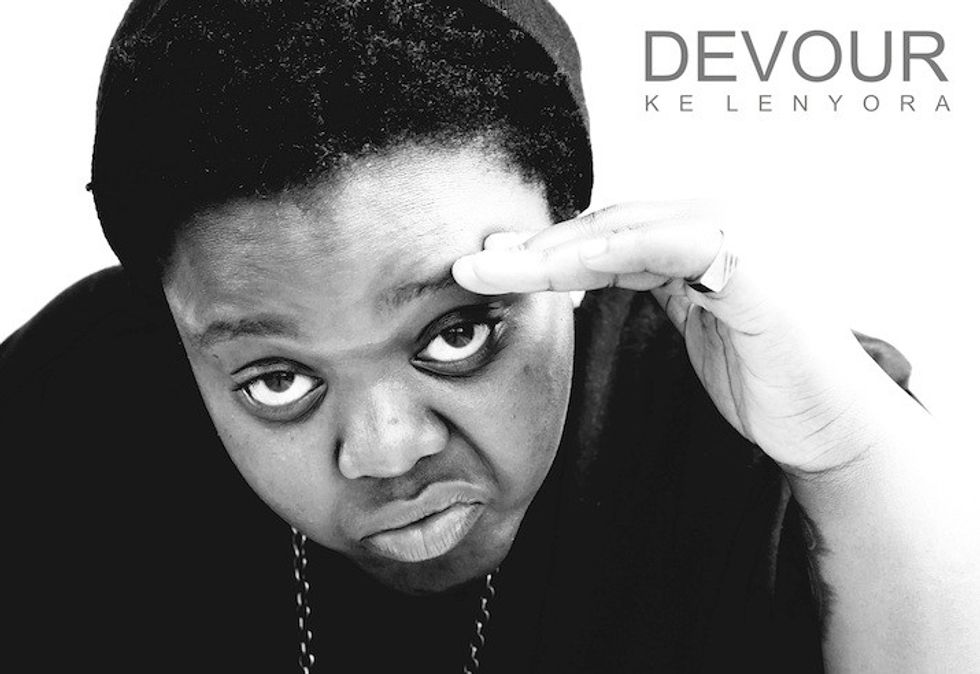6 South African Female Rappers Talk About the SA Rap Scene
Six of the top female South African rappers, including Gigi Lamayne and Patty Monroe, share their takes on the South African hip hop scene.
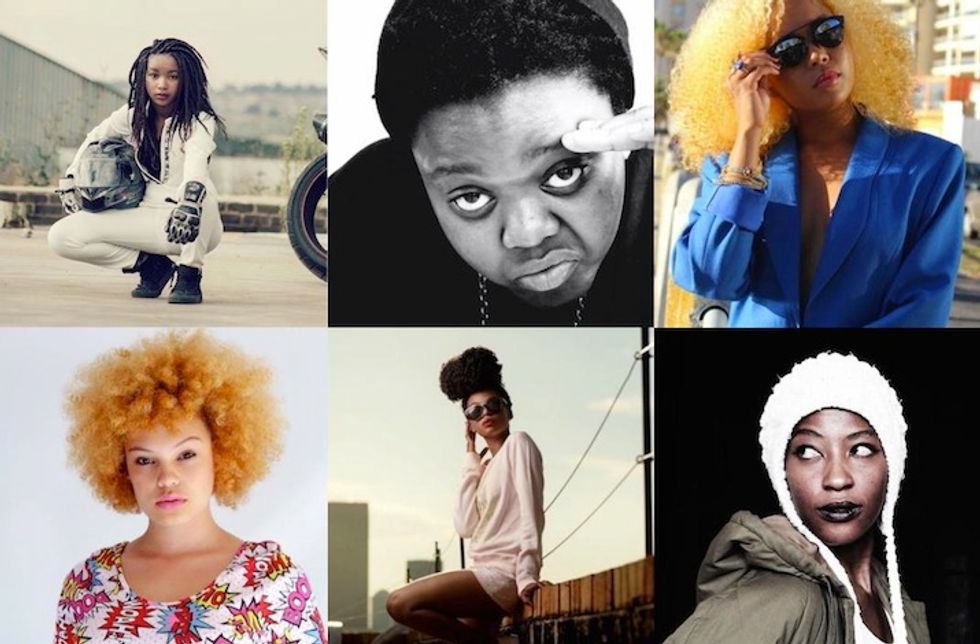
As topics such as sexism and the exclusion of women from hip-hop make headlines internationally, Stefanie Jason spoke to six female rappers in South Africa to get their take on the industry.
Every now and then, the state of women in hip-hop is brought into question. Whether it's the representation of women in the genre or highlighting the female rappers who have made an indelible mark on the industry, "women in rap" is a topic constantly touched on throughout the globe. The issue saw a recent revival in South Africa when well-known South African musician and poet Ntsiki Mazwai published an open letter to the hip-hop community.
In her letter, Dear Brothers in SA Hip Hop, Ntsiki writes about playing her part on the local rap scene (having hosted renowned Johannesburg-based hip hop events like Splash Jam and Black Sunday), and the treatment and erasure of women from the genre.
“I want to alert you of your sickness of hating, objectifying and not acknowledging the female spirit which has helped in the building of South African Hip Hop," she writes. While detailing how female musicians tend to be marganalised on the scene, Ntsiki adds that, “As things stand, SA Hip Hop is VERY masculine."
In a January article titled In Between Cultural Appropriation, Racism, and Sexism: Azealia Banks and the Erasure of Black Women in Rap, Austin McCoy points out how structures like award shows and the media aid the marginalisation of women (particularly black women) from hip-hop. “This was evident in Complex's recent story, The Best Rapper Alive, Every Year Since 1979," he writes. “Three women - Roxanne Shante (1984), Lauryn Hill (1998), and Nicki Minaj (2010) - earned honorable mention. So, according to Complex, out of the hundreds of rappers, only three black female rappers have made an impact on hip hop culture as individual artists in 35 years."
Back in South Africa, the country's only award show specifically aimed at the genre, the SA Hip Hop Awards, reinforces McCoy's assertion that structures aid the exclusion of women in rap. With categories like “King of Limpopo," “King of Gauteng," “King of Free State," it's hard not to wonder how women can get recognition as hip-hop practitioners at the awards. The media's constant highlighting of South Africa's male rappers has also clouded the contribution that women have made to the country's industry, which Ntsiki details in her open letter. A 2013 XXL magazine article on South Africa's top 10 rappers, for example, included not a single female rapper.
Despite the harsh reality for women emcees, Osmic Menoe, the organiser of the SA Hip Hop Awards, seems positive about the future for women in the genre. “I think it's starting to shape up a bit and get more progressive. It's getting to that point where their voices are getting heard because there are more [female rappers on the scene] than in other years. For them to get to where they are now they also went through a lot of struggles."
Asked about his thoughts on female rappers in relation to the SA Hip Hop Awards, Osmic recalls the show's bleak past. “At some point in time, when it came to the awards, there were no women that we could find until [we hosted] workshops. We had a workshop about two years ago – during the second year of the awards - called 'The female aspect of the culture'," he says. “The minute five women start looking big and like they are doing it, what that does is bring in 10 or 20 more because they can see that it is possible, and that it can happen."
As South African female rappers like Gigi Lamayne, Nadia Nakai and Missy RBK continue to rock the industry, I spoke to six emcees about their music and thoughts on being women in a male-dominated industry.
Stefanie Jason writes stories for the Mail & Guardian Friday when she's not rumbling through Johannesburg's dusty thrift store stockpiles and gallivanting around the city's many visual art galleries. You can follow her on Twitter @StefJason.
Yugen Blakrok
Disciple of rap superstar groups like Wu Tang Clan and Organized Konfusion, Yugen Blakrok describes her music as alternative hip-hop, which straddles on the “darker and more lyrical" side of rap. And after hearing her 2013 album Return of the Astro-Goth, it's easy to understand why. With its boom-bap-sounding backdrop, the Eastern Cape rapper, who is currently based in Joburg, uses her futurist lyrics to comment on social landscapes. Signed to renowned indie label Iapetus Records, Yugen was nominated for Best Freshman, Best Female Emcee and Best Lyricist at the 2014 SA Hip Hop Awards.
How would you describe the content of your rap?
The topics that I rap about are quite universal and I put a lot of time into the imagery of the raps. I'm always speaking from a human being perspective and not from a 'I'm a female emcee' or 'I'm an African' perspective. The content that I put into songs are experiences that I go through.
Isn't it hard to separate being a woman and African from your experience?
Sure, but I'm not letting my gender define me. An emcee is an emcee. Within the hip hop culture, emceeing is based on your actual skill. I don't use terms like female emcee or femcee, because if you want to reach out to an audience you have to be real. And that's not something that I'd like people to focus on when it comes to me. The fact that I'm a woman does come into play at some point when listening to my music but I'm all about breaking the boundary.
I was looking at the nomination list of the awards and I noticed that it's a very male-dominated list. What do you think of gender and hip-hop in SA?
We've got a long way to go. Last year I was nominated for three categories, and one was lyricist of year award, which I was the most excited about. Just getting the acknowledgment from this industry that we're working so hard towards building, meant a lot. I did notice that I was the only woman nominated in that category, and I think that can create the illusion that women don't have something worth saying. I was also the only female artist who performed at the awards. And when they do screen it on TV, there are certain things that they cut out [like my performance]. On a personal, I didn't think that having one representative of the hip hop culture was true reflection of where we're at.
So what do you think the industry should do to overcome these gender biased issues?
We're not saying, 'put us on the frontline because we're women' but when a woman is there, and she does have the skill - why make things extra difficult for her? Why make her feel like a woman, when she's coming to you like an emcee or as an artist?
Chazz Le Hippie
Energetic Chaz Le Hippie might be fairly new to the South African rap industry, but she's already made her mark on it. Crowned the "Queen of Street Rap" last year, the 17-year-old – who is completing her last year of high school – says she wants to focus on her studies before seriously putting her brand out. But that's too late, because the West Rand, Johannesburg-based rapper is already getting heavy airplay and performance time. With her fast-paced raps, Chaz mixes up the local language seTswana and English, a South African rap sub-genre known as Motswako.
Why did you steer towards a motshwako sound?
For me, motshwako wasn't a choice, it's how I developed my talent at [my label] Mawaza studio, which is where I was surrounded by a lot of motshwako rappers. There I learnt how amazing our mother tongue is and how it can tell a story. So I made a transition from an English rapper to a motshwako rapper.
How would you describe motshwako?
It's a mixture of everything. I would define it as a language that doesn't define your boundaries.
Can you tell us more about your title, Queen of Street Rap?
In 2014 I was crowned the Queen of Street Rap in Soweto [at a festival held by hip hop event Slaghuis]. It was competition and I battled over 10 female rappers. So now, there's a documentary being shot about it and I'll be featuring in it as the Queen of Street Rap.
Cool. And would you mind sharing your thoughts on SA's rap culture?
The SA hip hop culture and fraternity is developing immensely especially the interest in us female rappers. This is definitely going to be an interesting year for us as it has been labeled as our year. I'll still be on top of my game and authentic on all levels.
And what about being a female rapper?
I feel that any female rapper could tell you that the rap industry is a male-dominated one. It's very hard for women in the industry. On the one hand it's wonderful experience because people anticipate your raps as a woman because you're something new, especially in South Africa. But on the other hand it's not easy, because the media platform perceive female rappers in a certain way. And I feel that if you don't fit into that category then there's not much exposure for you.
Rouge
Pretoria-born and bred rapper Rouge is undoubtedly one of the country's most exciting rappers right now. Her debut single, “Party," which she released at the end of 2014, reached the number one spot on national radio station 5FM's hip hop show The Stir Up. The big-haired, punchy lyricist's latest single, "Mi Corazon," has also received heavy rotation so far. Having just completed a degree in film and drama, the rapper of Congolese descent says, “I'm 100% focused on my music now. I was lucky that after school everything fell into place. I've been releasing a few singles, like 'Party' and 'Mi Corozon,' but I'm pushing to drop my album at the end of September."
What do you think of the landscape in SA?
I think it's fantastic. It's amazing how hip hop has come into the foreground and it's an interesting time to be in the hip hop music industry now.
How do you let your South African-Congolese heritage come through in such an American genre?
By the stories that I tell; I'm a storyteller. I don't like talking about what I don't know about, and what I do know about is where I come from. So this comes through in my lyrics and the instruments. I love incorporating drums and French, where I can.
What do you think of female rappers on the scene?
I don't think that we have been delivering in the past. It's been tough but I think that it's an opportunity for us to take over. Especially now, it's the best time to be a female rap artist.
Do you think the structures within the local industry support women in rap?
I don't think it did before, but now it does. We weren't delivering before, as I said, therefore I think there weren't any structures for us. Where as now, I think everyone wants to hear what we have to say. Now we're trending.
Who are some of your favourite female rappers?
I really love Gigi Lamayne, she is someone I can't deny. Lyrically, she is strong. Nadia Nakai, you can't write off. She's been there for a long time and has kept herself relevant. Those are the two that have really set the mark for us female rappers now.
Patty Monroe
Fresh on the scene for only a few months now, 20-year-old Patty Monroe's debut track, "High Fashion," marks her as a rapper to watch. The rapper's quirky debut single - produced by celebrated house producer Culoe de Song - delivers solidly and is far from cute. “I have a message, I don't just want to talk about tits and ass. There is a bigger picture," she asserts. Having recently moved from Cape Town to Johannesburg after signing to AfterLife Talent, "High Fashion" made it to the top 10 spot on Joburg youth radio station Yfm and secured her interviews on Vuzu TV and local hip hop magazine Hype. When asked about her love for rapping, Patty says: “I have always been a very outspoken person and music has been close to my heart. There's a way that you can use the two together and people will actually listen."
What do you think of hip hop in South Africa?
It's amazing and has done so well. 2014 was a great year for SA hip hop and it's cool that the rest of the world is accepting our heads. And now, especially since all these women have started stepping up, hip hop's going to be a much better and colourful place.
You're pretty young, do you feel intimidated by the scene?
I'm just young by the age the world gives me. I don't want people to let my age get in the way of what I'm doing.
What do you think some of the challenges are for women in rap?
I don't like the fact that people are always comparing female rappers. And I don't really like the superficiality. They say stuff like, 'look at how light her skin is', or 'she's a yellow bone'. I say, forget that and just focus on the art and the skill. In hip hop I feel that women get judged on being the whole package; and if you're not the entire package then they might not take note of you. Give everyone a chance.
Some of your favourites emcees?
Gigi Lamayne is dope and so is Busiswa [Gqulu], Rouge and Nadia Nakia. And in CPT, Miss Celaneous is good and representing where I come from.
Miss Celaneous
“With sexually charged lyrics, punchlines to boot and metaphors for days…[Miss Celaneous] aims at liberating woman from all walks of life," is how Cape Town-based emcee, Miss Celaneous's press biography goes. The lingerie-clad, deep-voiced rapper's style in her latest video “#CheckMeOout", shows just this, as she evokes the sultry imagery and lyrical finesse of rappers like Foxy Brown and Lil Kim. The founder of her own clothing label, #Tsak Apparel, Miss Celaneous has been featured as a fashionista on television channels like MTV. The rapper, who waxes lyrical in English and Cape Town slang, says she “started rapping six years ago. But it's only recently that my music is out on radio. The difference now, from six years ago, is that I'm pushing a lot harder and I've discovered a formula, which I'm sticking to."
How would you describe your style of music?
My style is authentic to Cape Town and its slang. I rap how I speak. I'm trying to promote Cape Town and Cape coloured culture. I'm very proud of where I come from and what I do. And the beats have to speak to me so that I can write to it. If I'm not feeling it, I won't put it out.
Care to share your thoughts on the South Africa's hip-hop scene?
To be honest with you, I'm extremely bored with the game at the moment. There's only a select few that are pushed to the fore and those few, I feel, are not the best in the industry. There are so many other people who are better but in SA there isn't really a chance for the underdogs to be exposed because of the industry's lack of infrastructure and money. But I'll shake things up this year.
So you're offering a solution?
Totally [laughs]
What do you think about being a woman in the SA rap industry?
It's kind of like a win or lose type of thing. There's so few of us, but what some people tend to do is pin us against each other because it seems as though there's just room for one. That's quite unfair because there are so many male emcees out there, why can't there be options for female rappers as well. There are a lot of dope female emcees, but we didn't really get the platform. However, recently that's changed quite a bit, which is pretty cool.
Devour Ke Lenyora
Devour Ke Lenyora delivers her music with a laid back flow that eases out lyrical mastery over gritty boom-bap beats. The Daveyton, East Rand Johannesburg-bred rapper says she is still studying the business side of the industry and is currently working on a mixtape. “I'm very seriously about the craft, I'm trying to be great at it. I don't want to blow up prematurely, I just want the time to be right," she says. As Devour works closely with MX DaFreshPrince and B.Ma to achieve that laid back, hazy sound that she is known for, the underrated emcee says she is working on developing her music: “I'm still polishing myself [to get a ] broader appeal; a mass appeal," she asserts.
What are your thoughts on SA's hip hop scene as a whole?
We've come a long way as a genre despite how infantile it is in the country. There's a lot of growth that's happened and people are warming up to it more.
Hip hop in the country has grown by leaps and bounds. The genre has experienced proud firsts in the last couple of months; from KO hitting the one-million viewer mark on Youtube last year, to Cassper Nyovest's album recently going platinum. Such things used to be unheard of in the SA hip hop community. The influence that the genre has in the country right now reminds me of the 1990s Kwaito era, which is where the voice and vibrations of the youth came from in overwhelming strength ... That right there is power.
And what about being a woman on the scene?
The female thing, eish, it's very tricky globally. But I don't see it as a con, I actually see it as a pro – it's to my advantage in fact. There's so much room for a female rapper who is, dare I say, dope, to be noticed. The only pressure for you as a female rapper, would be to come correct. Even if there are flaws to your raps, you should just go hard.
- 100 Women: A Playlist of Our Favorite Female Artists & Anthems ... ›
- 7 South African Female R&B/Soul Artists to Watch In 2020 - OkayAfrica ›
- 25 Up-And-Coming South African Rappers Under 25 You Need To ... ›
- 25 South African Rappers Under 25 Killing the Game - OkayAfrica ›
- Nadia Nakai Explains Why She Never Used to Work With Women Rappers, And it Makes A Lot of Sense - OkayAfrica ›
- 2018 Was the Year Women Won In (South African) Hip-Hop - OkayAfrica ›
- Lesotho MC Meloh Calls Out The Treatment Of Female Rappers In 'Soul Riddim' - OkayAfrica ›
- This Nigerian MC Is The Queen Of Freestyles - OkayAfrica ›
- Lauryn Hill In North Africa: An Inspiration For Resistance - OkayAfrica ›
- South African Rapper Gigi Lamayne is Bringing to Fans an All-Women Music Show - OkayAfrica ›
- This Rap News Webcast Uses the Ivorian Street Slang Nouchi - OkayAfrica ›
- 22 Drops New Single And Accompanying Visuals For 'I'M THAT GIRL' - OkayAfrica ›
- Things Take Time in the Empire of Sheep - OkayAfrica ›
